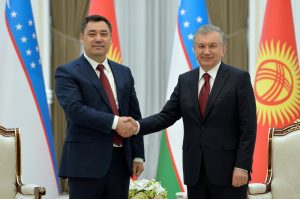Kyrgyz President Sadyr Japarov visited Uzbekistan for his first state visit to the country from March 11-12. The leaders of both countries focused on the decades-old border delimitation issue. The matter again proved its complexity when the Kyrgyz government had to issue a correction to a statement it had made two days prior related to the delimitation process. Two other issues, using transboundary water resources and the China-Kyrgyzstan-Uzbekistan railroad, are dominant topics in relations between the countries, but the sides preferred to focus on the border issue during the latest negotiations. This focus is most likely driven by Uzbek President Shavkat Mirziyoyev’s resolve to finalize the border with his Kyrgyzstan colleague before tackling other issues.
Uzbekistan has complicated border relations with all of its neighbors except, ironically enough, Afghanistan. Many of its border issues have remained unresolved to differing degrees for decades. The Kyrgyz side issued the details of the border delimitation plan for the remaining unresolved territory, although the statement had to be changed. At the same time, Uzbekistan limited its comments to resolution timelines only. What stayed unchanged in the official statement is that Uzbekistan was ready to give the disputed territory Ungar-Too to Kyrgyzstan in order to finalize border delimitation negotiations. It’s unclear whether that move from Tashkent is bound by Bishkek offering its own territorial concessions.
The first official statement from Kyrgyzstan announced the opening of air and ground transportation between Sokh, an Uzbek exclave in its territory, and the rest of Uzbekistan, located around 20 miles away. Bishkek retracted the statement after a couple of days and edited out the phrase “ground transportation” over concerns that the statement implied Kyrgyzstan was ceding control of the road connecting the exclave and Uzbekistan. In the follow-up statement, the Kyrgyz side reported that it meant it would be re-opening border crossing points closed due to the pandemic.
The negotiation process ahead might not be easy. Tashkent’s priorities are not the same as Bishkek’s. While the Uzbekistan-Kyrgyzstan border is the dominant concern for Uzbekistan because it overwhelmingly affects its citizens, and a year ago led to a border conflict that injured 187 people, for Bishkek the main issue is transboundary water usage. Several days before Japarov’s state visit to Tashkent, the Kyrgyz president stated that if Kyrgyzstan did not receive electricity from Uzbekistan and Kazakhstan to cover winter domestic shortages, the country would not be able to supply water to these countries during the growing season. The Kyrgyz foreign minister alluded to the same sentiment when he said, “there is no mutually beneficial cooperation in this area in the Central Asian region.”
Tashkent is also dependent on Kyrgyzstan’s cooperation to finally realize the China-Kyrgyzstan-Uzbekistan railroad project. Previous Kyrgyz presidents had varying degrees of interest in the project. So far, the current president has a positive outlook on the project. Japarov said earlier this month, “We deeply believe that if we build this road [China-Kyrgyzstan-Uzbekistan] we, as a central transnational country, will be able to further develop the Silk Road and relations with all countries in the world. This is a priority for our state.”
Mirziyoyev evaluated the meeting with Japarov positively. He said that for the past 30 years of mutual relations, for the first time, he saw a meeting where sides are serious and dedicated to resolving border delimitation matters between the countries. The sides managed to outline the timelines for milestones and appointed responsible officials for specific areas, which was not the past approach.
Japarov’s state visit to Uzbekistan indicated that Mirziyoyev’s foreign policy focus with the new Kyrgyz leader will prioritize the resolution of the border issue. The renewed focus indicates that the case received little attention, or came to a stalemate under the previous Kyrgyz leadership. That led to the flare of border conflict in the summer of 2020. The Uzbek leadership most likely hopes to seize the moment with the new Kyrgyz leadership to prevent future and more significant border conflicts.

































